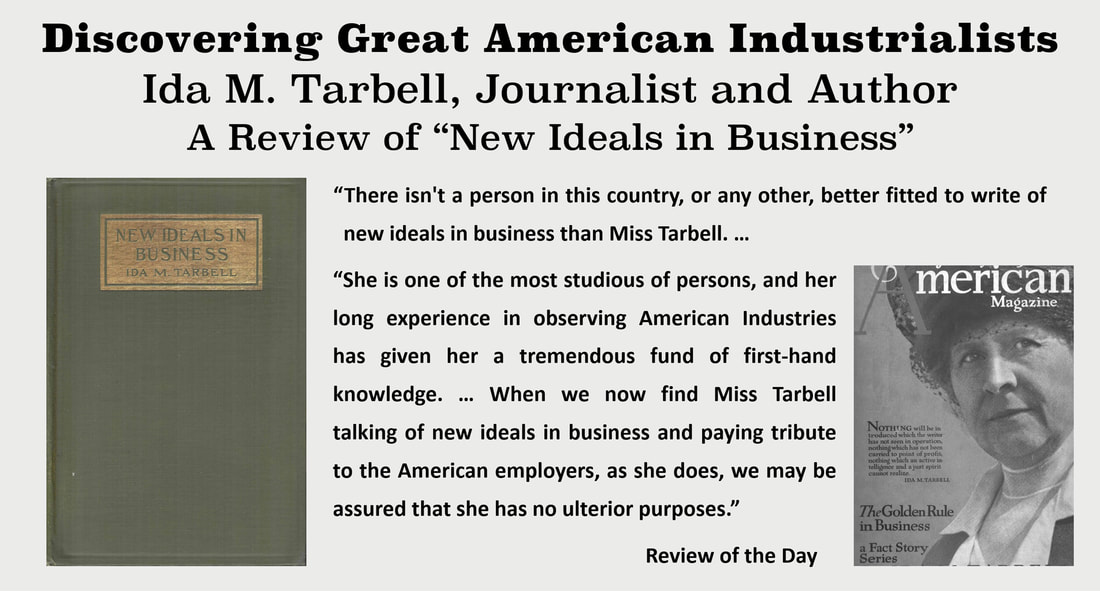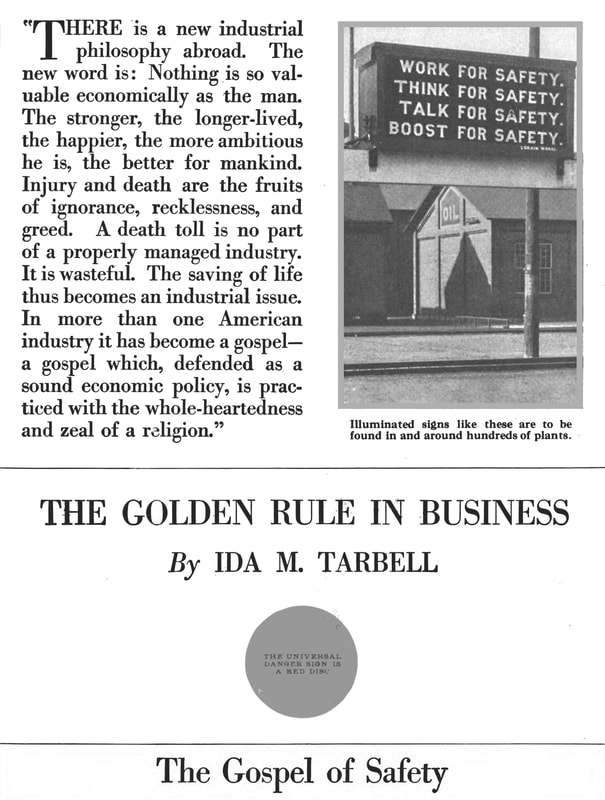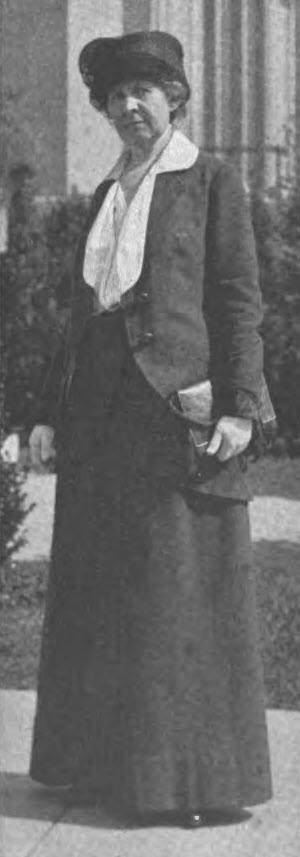A Review of Ida M. Tarbell's "New Ideals in Business"
|
|
Date Published: June 28, 2021
Date Modified: January 10, 2024 |
This book was a wonderful find and an easy, insightful read. It is not about a single American industrialist but about many who were running their businesses with a new management concept—one that brought employer and employee together in the pursuit of a common goal.
This is a consolidation of and an extension to a series of articles that Miss Tarbell wrote for the American Magazine under the title "The Golden Rule in Business."
This is a consolidation of and an extension to a series of articles that Miss Tarbell wrote for the American Magazine under the title "The Golden Rule in Business."
The new management employs not only science but humanity, and by humanity I do not mean merely or chiefly sympathy but rather a larger thing, the recognition that all men, regardless of race, origin or experience, have powers for greater things than has been believed. I doubt, indeed, if there has been any economic and social gain in the last fifty years which equals this growing conviction of the Powers of the Common Man. …
Nothing is introduced [in this book] which I have not seen in operation; nothing which has not seemed to me to be good for the worker, skilled and unskilled; nothing which has not been carried to a point of profit; nothing which an active intelligence and a just spirit cannot realize.
A Review of "New Ideals in Business" by Ida M. Tarbell
- Reviews of the Day: 1916-17
- Selected Quotes from "New Ideals in Business"
- This Author’s Thoughts and Perceptions
Reviews of the Day: 1916-17
|
"The high priestess of the cult of industrial optimism, Ida M. Tarbell, has spoken most interestingly in her latest book. … It is an account of some of the new [business] ideals, of how they have been put into practice, of their effects on men and profits. It is not an 'uplift' book according to the author's premises, but an illustrated catalog of the betterments she claims to have found."
The Oakland Tribune, December 17, 1916
"A notable contribution to industrial peace and economic welfare is made in Ida M. Tarbell's latest. … The gifted author obtained her material first hand, and it would be difficult to name any work in this field which has arisen out of closer personal investigation or more intimate contact with both employed and employers."
|
The Buffalo Times, January 16, 1917
"There isn't a person in this country, or any other, better fitted to write of new ideals in business than Miss Tarbell. She is one of the most studious of persons, and her long experience in observing American Industries has given her a tremendous fund of first-hand knowledge. … When we now find Miss Tarbell talking of new ideals in business and paying tribute to the American employers, as she does, we may be assured that she has no ulterior purposes."
The Dayton Daily News, February 8, 1917
Editor's note: This book was highly advertised and highly reviewed.
Selected Quotes from "New Ideals in Business"
|
A silent revolution is coming in American industry
"However great the lack of efficiency and justice in American industry, it is undergoing a silent revolution. This revolution is centered in industrial management. Back of it lies a belated realization that the responsibility for the weaknesses and unrest of our industrial life does not rest with the American workman, but with his employer.
"The stability of this new movement lies in the fact that management is summoning to its aid great forces which it has hitherto believed to have little or no part in its function. It has summoned science, and growing numbers of American business managers are holding that there is no task which men perform which should not be studied scientifically. "The new management employs not only science but humanity, and by humanity I do not mean merely or chiefly sympathy but rather a larger thing, the recognition that all men, regardless of race, origin or experience, have powers for greater things than has been believed. I doubt, indeed, if there has been any economic and social gain in the last fifty years which equals· this growing conviction of the Powers of the Common Man." |
The book consolidates and updates information from an American Magazine series
|
The final paragraph of the book
"He [the businessman] is seeing a significance and a possibility in humanizing his relations that he formerly did not dream. He is developing the inspiring consciousness that it is possible for him to be not a mere manufacturer of things for personal profit, but as well a maker of men and women for society’s profit."
This Author's Thoughts and Perceptions
|
In this beautifully written book, Ida Tarbell covers companies such as Metropolitan Life, The Kodak Company, Proctor and Gamble, Norton Company, Link Belt Company, Boston Consolidated Gas, Baker Manufacturing, U.S. Steel Corporation, Westinghouse, and Link Belt Company. She also covers such exotic characters as "Golden Rule" Jones and "Safety First" Thomas Lynch.
This book is a consolidation of articles that Ida wrote for The American Magazine. I wish they would have published the book with the pictures that were included in the magazine (one is included here). The articles are much more powerful with the supporting imagery. Although I had read that Firestone Tire Company, U.S. Steel Corporation, Endicott-Johnson Company, and IBM built homes for their workers, it is amazing to see it documented in pictures. |
If you want to realize how far Corporate America came in this period, consider this from the book (a personal observation of Miss Tarbell as she did her on-site research):
Any one familiar with old conditions and the new understands what experts mean when they tell you that safety meetings are frequently like prayer meetings. ... I had some terrible memories to take with me, for I had been close at hand once when a smelting furnace burst and the flood of molten iron had caught a dozen laborers on the pig-bed. I had seen the victims of an overturned ladle carried to their homes. All my old impressions were destroyed at a glance, for I was confronted with an order in yard and plant that I had supposed impossible in steel- and iron-making.
Isn't this what the United States of America is all about: overcoming the supposedly impossible?
|
One begins to wonder if Miss Tarbell wasn't right, that maybe we need to examine our chief executives a little more closely in their works rather than their words? Focus on the great ones! When we encounter chief executives that will not accept responsibility for the conduct of their companies, they should be examined and the extremes of maximizing shareholder value—shareholder-first and -foremost, or me-first and -only—rooted out by the boards of directors.
Maybe with a better understanding of American corporate history we will understand what drove some of the greatest corporations of the United States in the 20th Century. Why have we gotten history so wrong, and our priorities so mixed up: focusing on stock-price-first rather than business-first? Cheers, - Pete |




